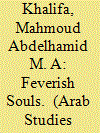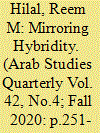| Srl | Item |
| 1 |
ID:
178109


|
|
|
|
|
| Summary/Abstract |
The archive is used both literally and metaphorically as a manifestation of the ubiquity of power and the authority invested in material archives. To work from the margin and in secrecy is a trait of the subaltern quest of both Wadood the bookseller and Dr Nameer, as well as the different characters of the De Molina family. The official history written by the powers that be marginalizes the other. However, the digging of the archives by the subaltern raises the hope of an alternative history that saves the traces of the subaltern. The archive includes physical archives, manuscripts, artefacts, stamps, cassettes, and photos, as amply shown in Fihris. In Ḥiṣn al-turāb, the archive has more of a metaphoric than literal meaning: it is the spectral topos of suppressed desire and recovered memory. The archive enables the subaltern to speak by digging up and even making up archives. Both quests are feverish and reflect the trauma that motivates digging up the past as recovered memory and the desire to keep traces of the past as tokens of a marginalized identity seeking redress. Archives are tokens of the past that threaten the integrity of the history written by the powerful: the hunter. The victims question that history and create nuisance that offers hope of a more just history that includes the marginalized subalterns.
|
|
|
|
|
|
|
|
|
|
|
|
|
|
|
|
| 2 |
ID:
178106


|
|
|
|
|
| Summary/Abstract |
This article explores the way in which Laila Halaby in Once in a Promised Land and Alia Yunis in The Night Counter utilize the Arab folk tradition in novels on Arab and Muslim American experience to counter the dominant narrative that simultaneously erases their extensive history in the United States and juxtaposes it with a forced visibility that is marked by Otherness, threat, and distrust. The article argues that by using folkloric figures and storytelling structures, Halaby and Yunis reverse the positionality of these communities by marking the multiple cultural signifiers that inform their stories in order to construct a palimpsest that reinscribes Arab and Muslim American experiences within narratives that perceive them as problems. As such, the Arab folk tradition emerges as a significant mode in the cultural memory of Arab and Muslim Americans, and the American literary fabric more broadly, and takes on a new meaning in this context.
|
|
|
|
|
|
|
|
|
|
|
|
|
|
|
|
| 3 |
ID:
178107


|
|
|
|
|
| Summary/Abstract |
The nineteenth-century American novelist, Herman Melville, is oftentimes viewed as a multi-cultured innovator who possibly anticipated post-modernism. In his epic romance, Mardi, Melville incorporates aspects of Orientalism within a Westernized framework, thereby eroding cultural borders. This article focuses on Arabian Nights as one possible parent text for Mardi on the one hand, and on Melville's naturalization of certain Orientalist concepts in his novel on the other. Furthermore, it explores the question of whether Melville “whitewashes” the Eastern narrative to naturalize the text and thus familiarize Westerners with a foreign culture in the spirit of multi-culturalism, or whether he simply subscribes to the Orientalist stereotypes prevalent in nineteenth-century America.
|
|
|
|
|
|
|
|
|
|
|
|
|
|
|
|